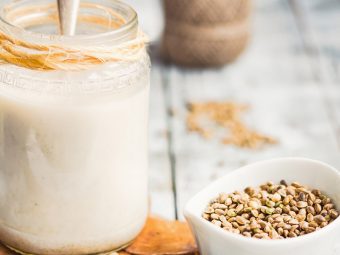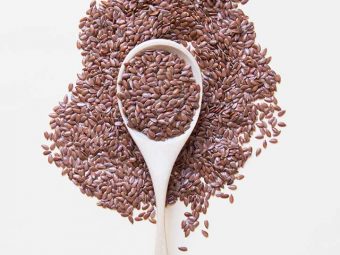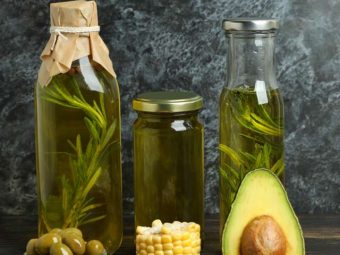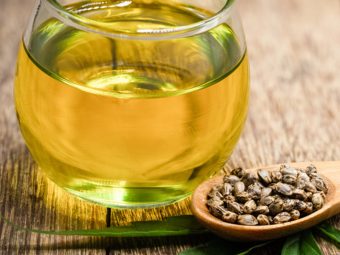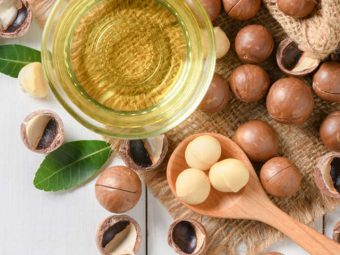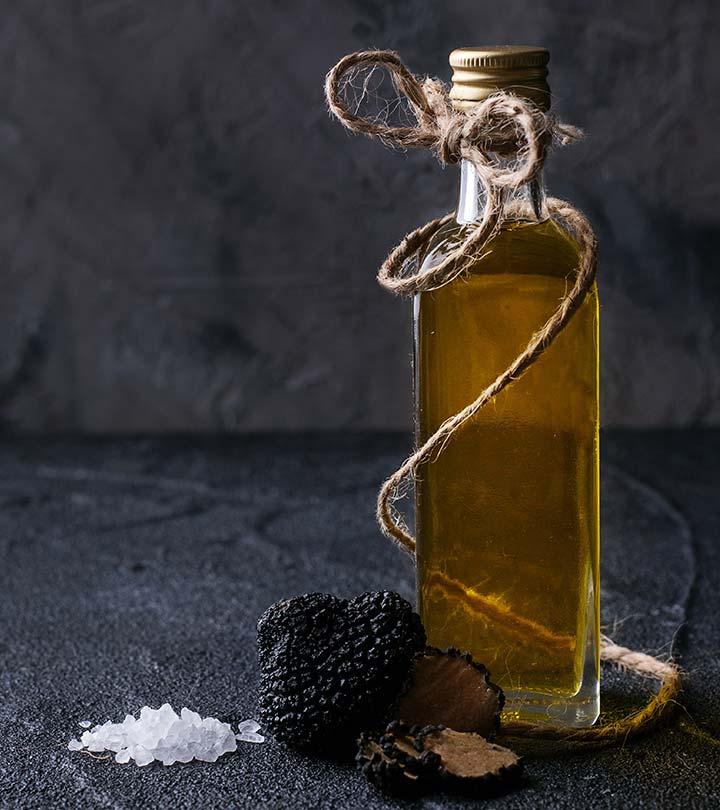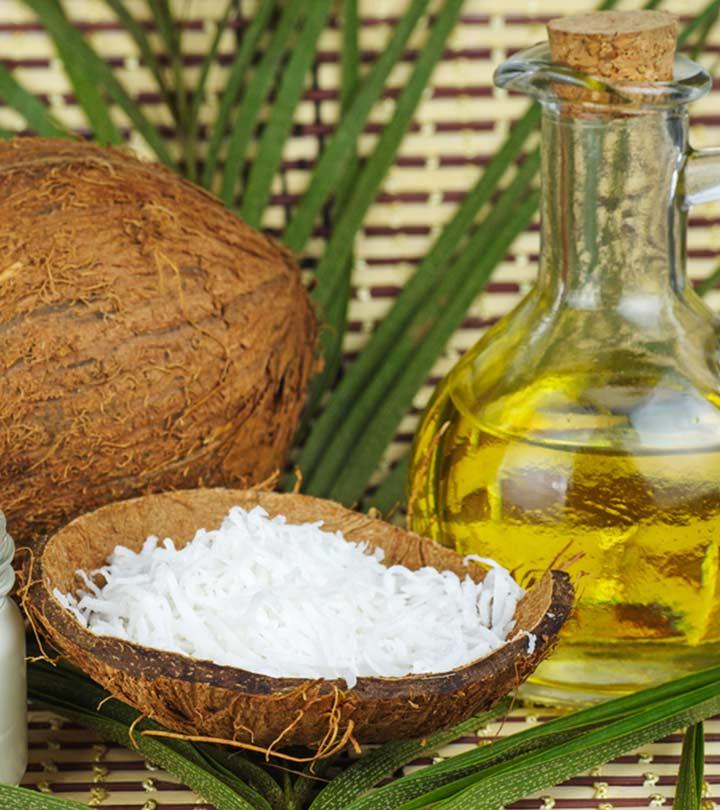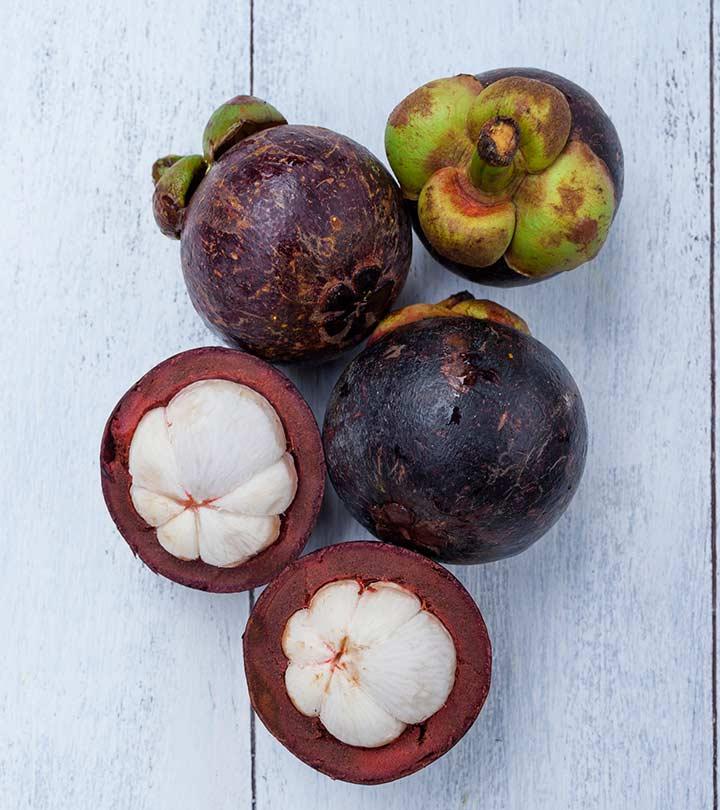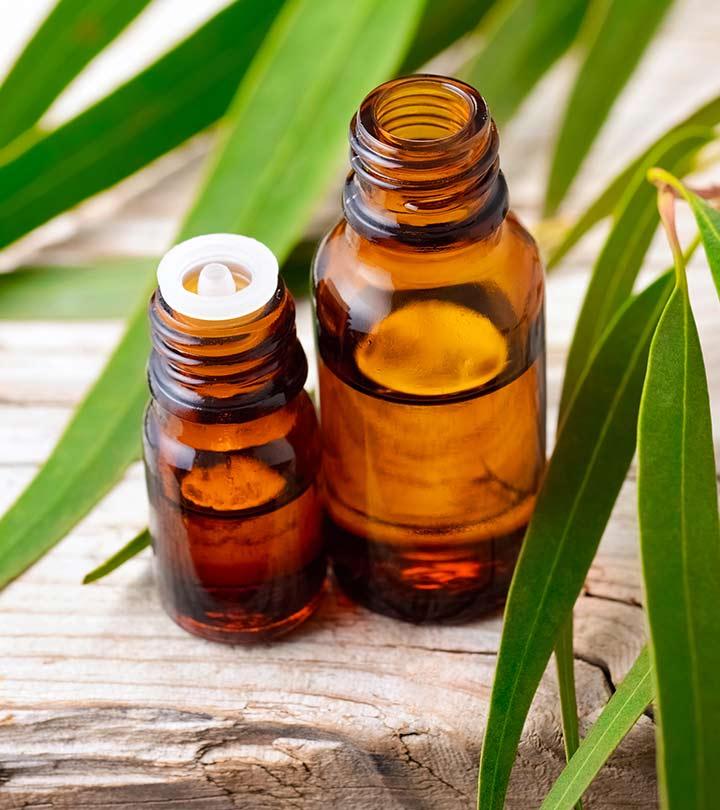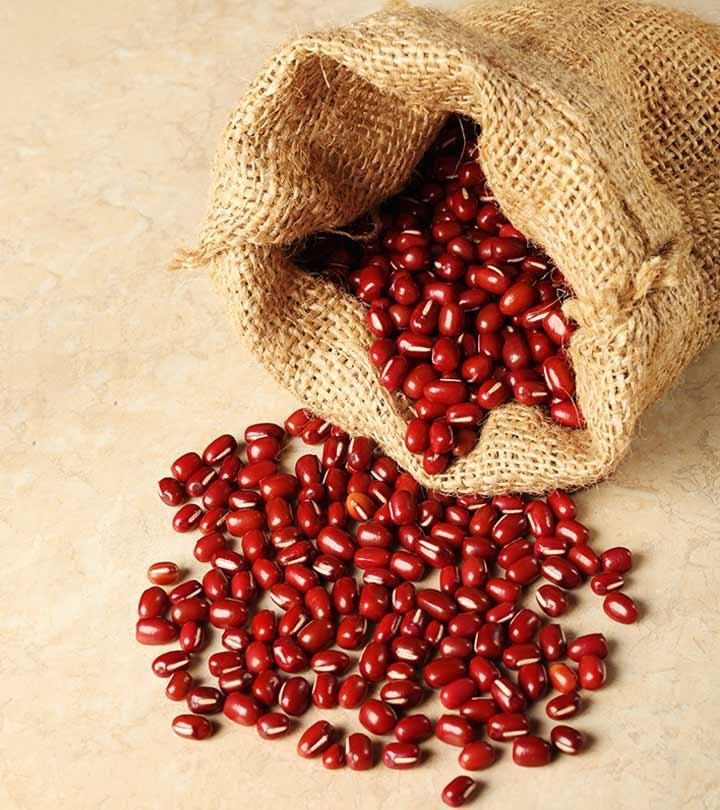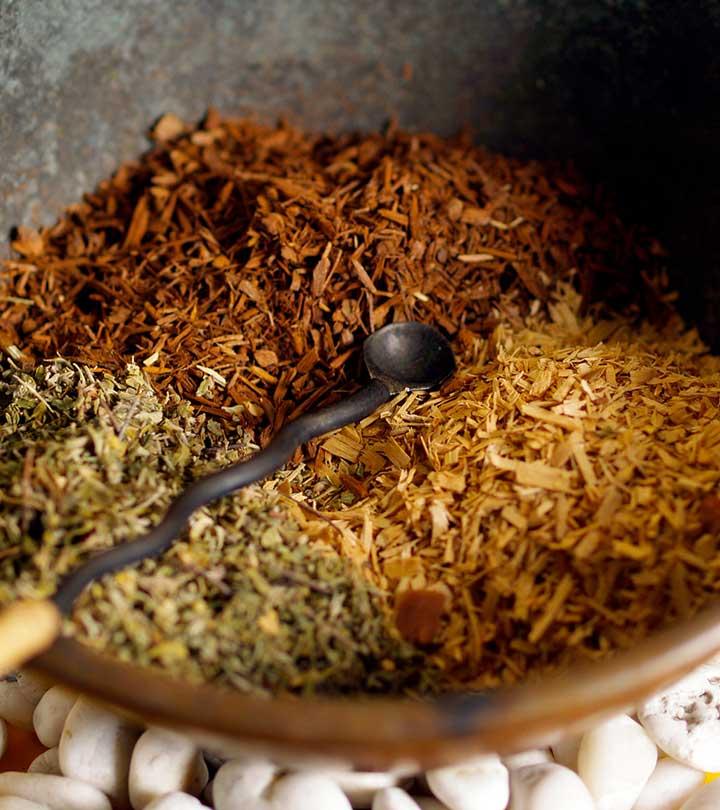Hemp Seed Oil Benefits, Nutrition Profile, And Side Effects
Unveil the hidden potential of this liquid gold elixir offering a wealth of benefits for holistic health.
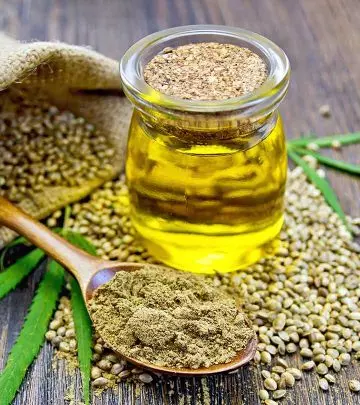
Image: Shutterstock
Hemp seed oil benefits may persuade you to use this oil regularly. It is derived from the hemp seed, a part of the cannabis plant (marijuana). This oil is loaded with many nutrients and beneficial bioactive compounds. Antioxidants and essential fatty acids present in the oil may aid in reducing inflammation and other common ailments. The hemp seed oil also helps boost heart, brain, and gut health. In addition, it aids in weight loss and helps ease menstrual cramps.
This oil does not have psychoactive effects, as marijuana does. This article discusses the benefits of hemp seed oil, its nutritional profile, how to use it for maximum benefits, and any potential side effects. Take a look.
In This Article
What Is Hemp Seed Oil? What Is It Good For?
Hemp seed oil is derived from hemp seeds. Though marijuana comes from the same plant, hemp seeds contain just trace amounts of THC (the most active ingredient of marijuana), and they don’t get you high.
The oil is filled with antioxidants and anti-inflammatory agents and other essential fatty acids (like GLA), all of which are known to combat diseases like inflammatory arthritis, cancer, diabetes, and heart disease.
Did You Know?
You can use hemp seed oil to varnish woodwork as well. Mix a little oil with lemon juice and apply it over finished wood using a cotton ball.
What Are The Benefits Of Hemp Seed Oil?
1. May Fight Inflammation
Hemp seed oil is rich in GLA (gamma linoleic acid), which is an omega-6 fatty acid that may boost immunity and fight inflammation.
However, both animal and human studies still need to conclude how effective the anti-inflammatory properties of hempseed could be (1).
The oil is also a good source of anti-inflammatory compounds, which may help relieve arthritic symptoms. More research is required to study its anti-inflammatory effects.
Hemp seed oil, when taken along with evening primrose oil, was found to improve symptoms in individuals with multiple sclerosis (which can be caused by inflammation) (2). Experts theorize it might also help in the treatment of fibromyalgia.
2. May Boost Heart Health
A meal containing hempseeds was found to help prevent high cholesterol levels. The results could be attributed to the polyunsaturated fatty acids in the seeds. These seeds (and their oil) could show potential in the treatment of cardiovascular disease (3).
As per an animal study, hemp seed oil was found to reduce cholesterol absorption. Another study states that taking 30 mL of the oil every day for four weeks reduces the ratio of total cholesterol to HDL cholesterol (4). This may promote heart health.
It also is thought that in addition to the fatty acids, certain other bioactive compounds found in hemp seed oil may also help in this regard. The oil has omega-6 and omega-3 fatty acids in the optimal ratio – 3:5:1 to 4:2:1, which seems to satisfy the modern standards of healthy nutrition (5).
3. May Aid Diabetes Treatment
Diabetes is also linked to an unbalanced intake of essential fatty acids. As hemp oil is rich in essential fatty acids, it may work as a good supplemental treatment (6).
However, we need more research before we conclude that hemp seed oil can benefit diabetes. Please consult your doctor before using the oil for this purpose.
4. May Help Reduce Cancer Risk
The tetrahydrocannabinol in hemp seed oil may help inhibit certain forms of cancer. Most animal studies have shown the tumor-inhibiting action of tetrahydrocannabinol (7).
However, we need more additional trials to understand the antitumor effects of tetrahydrocannabinoland hemp seed oil (7).
Other studies have shown that cannabinoids derived from hemp seeds may aid in the treatment of cancers of the lung and breast (8).
The GLA and omega-3s in hemp oil may also help, but we need more research to confirm the findings.
5. May Improve Brain Health
The hemp seed oil contains cannabinoids. Studies show that these may help ease anxiety in those with a social anxiety disorder (9).
Studies also support that inhalation of hemp essential oil can have a relaxing effect on the nervous system. Inhaling the oil (aromatherapy) is believed to enhance the mood. There is a possibility that the oil may also have antidepressant effects (10).
The essential fatty acids in the oil may also improve memory and prevent age-related cognitive decline. Further studies are warranted to arrive at a conclusion.
6. May Boost Immunity
The oil contains omega-3 fatty acids. Some research shows that omega-3 fatty acids may boost immunity and enhance protection against infections and other related ailments (11).
7. May Be Beneficial During Pregnancy
Hemp seed oil is also a great option for all pregnant mothers. Again, a major part of the credit goes to the omega-3 fatty acids.
According to an American study, adequate intake of omega-3 fatty acids is critical during pregnancy as they are the building blocks of the fetal brain and retina. They also play a major role in preventing perinatal depression (12).
Oils containing omega-3 fatty acids can also help prevent preterm delivery and promote an easier birth and the baby’s optimum lifelong wellness (13).
However, there is less information available on the safety of hemp seed oil during pregnancy. Also, whether the omega-3 fatty acids in the oil would benefit during pregnancy is still a matter of debate. Hence, we recommend you consult your doctor.
8. May Enhance Digestive Health
Direct research on the efficacy of hemp seed oil on promoting digestive health is lacking. However, the EPA and DHA (in the omega-3s in the oil) were found to synthesize compounds called eicosanoids (14).
Some experts believe that these eicosanoids may regulate the secretion of digestive juices and hormones, thereby aiding the overall digestive process. However, sufficient research is lacking in this regard.
It also is believed that the small amount of protein in the oil is identical to the one present in our blood, which may help in alleviating digestive troubles (as the protein gets easily digested in the human body). More studies are warranted to establish this theory.
Did You Know?
In America, it was legal to pay taxes with hemp from the 1630s to the early 1800s.
9. May Be Useful For Skin Care
Hemp seed oil can help you get beautiful and healthy skin. It acts as a moisturizer and prevents your skin from becoming dry during the winters (15). In other words, it keeps your skin soft, fresh, and hydrated.
You can try applying hemp seed oil all over your body after taking a bath. You will notice the difference in a few days. However, we suggest you do a patch test first as anecdotal evidence suggests that hemp seed oil may cause allergies.
Some sources suggest that the oil does not clog your pores. Its linoleic acid may regulate sebum production. Lack of linoleic acid in the diet can provoke the sebum to clog our pores, which gives rise to blackheads, whiteheads, or acne lesions. In fact, those with acne had decreased concentrations of linoleic acid on the skin surface (16). You can wet your face, pat it dry, and apply the oil to the affected areas. Massage properly. Use it once a day.
You can use hemp seed oil in a similar way to removing makeup.
10. May Protect Skin From Disease
Dietary hemp seed oil may be used to treat atopic dermatitis. Studies attribute this therapeutic effect to the polyunsaturated fatty acids in hemp seed oil (17).
Some evidence suggests that hemp seed oil can also be used as a treatment for eczema. The oil strengthens the skin and makes it resistant to bacterial and fungal infections (18).
The essential fatty acids in the oil act may as an internal moisturizer, helping relieve eczema symptoms. Taking the oil thrice a day, along with applying it to the affected areas on the skin, could be beneficial. But since solid research is lacking in this regard, consult your doctor before using the oil for eczema treatment.
Using the oil every day for 20 weeks was also found to relieve the symptoms of dermatitis. This is especially true with the itching associated with the condition (17).
Some believe that the oil may also help relieve shingles, which is one type of rash. Anecdotal evidence suggests that hemp oil may reduce the inflammation and even protect the nerve cells (that are usually attacked in this condition). Consuming hemp oil could help you deal with the symptoms of pain, though more research is needed here.
But since each case of shingles could be unique, we suggest you talk to your doctor and take their advice on the way you need to use hemp oil to treat your condition. There also is limited research in this area. Hence, talking to your doctor should help.
Hemp seed oil may also be used to prevent sunburns. Some believe adding zinc oxide to the oil can boost its SPF rating (from a rating of 6). However, there is no research to support this. The oil could be one great way to soothe a sunburn as it is believed to protect the delicate layers of the skin.
Insufficient evidence for the following
11. May Aid Weight Loss
Studies have shown that individuals taking GLA supplements for a year gained back less weight (19). Since hemp oil is rich in GLA, it may also help in this aspect. However, there is no research supporting this statement.
The omega-3s in hemp seed oil may also contribute to weight loss in some way. But there is very little research to support this. Hence, it is important you talk to your doctor before using hemp seed oil for this purpose.
12. May Help Relieve PMS Symptoms
GLA may help ease menstrual cramps. Studies show that supplementation with fatty acid may not cause any side effects (20).
Anecdotal evidence also suggests that hemp seed oil may help treat breast tenderness, feelings of irritability and depression, and swelling. There is no research to support this, though.
13. May Boost Hair Growth
The healthy fats in hemp seed oil are believed to add moisture and shine to hair. The oil is also thought to strengthen fragile hair strands and can make your hair thicker. It may promote new hair growth as well.
Using the oil on the scalp, as per anecdotal evidence, may also reduce several scalp problems, including itchiness, dryness, and dandruff. The oil may also aid the treatment of scalp psoriasis.
 Pro tip
Pro tipThese are the different ways hemp seed oil can benefit you. Knowing its nutritional profile can help you understand the benefits better.
What Is The Nutritional Profile Of Hemp Seed Oil?
| Nutrition Facts Serving Size 30g | ||
|---|---|---|
| Amount Per Serving | ||
| Calories 174 | Calories from Fat 127 | |
| % Daily Value* | ||
| Total Fat 14g | 21% | |
| Saturated Fat 1g | 5% | |
| Trans Fat 0g | ||
| Cholesterol 0mg | 0% | |
| Sodium 0mg | 0% | |
| Total Carbohydrate 2g | 1% | |
| Dietary Fiber 1g | 4% | |
| Sugars 0g | ||
| Protein 11g | ||
| Vitamin A | 0% | |
| Vitamin C | 0% | |
| Calcium | 0% | |
| Iron 16% | 16% | |
Vitamins | |||||
|---|---|---|---|---|---|
Amounts Per Selected Serving | %DV | ||||
Vitamin A | ~ | ~ | |||
Retinol | ~ | ||||
Retinol Activity Equivalent | ~ | ||||
Alpha Carotene | ~ | ||||
Beta Carotene | ~ | ||||
Beta Cryptoxanthin | ~ | ||||
Lycopene | ~ | ||||
Lutein+Zeaxanthin | ~ | ||||
Vitamin C | ~ | ~ | |||
Vitamin D | ~ | ~ | |||
Vitamin E (Alpha Tocopherol) | ~ | ~ | |||
Beta Tocopherol | ~ | ||||
Gamma Tocopherol | ~ | ||||
Delta Tocopherol | ~ | ||||
Vitamin K | ~ | ~ | |||
Thiamin | ~ | ~ | |||
Riboflavin | ~ | ~ | |||
Niacin | ~ | ~ | |||
Vitamin B6 | ~ | ~ | |||
Folate | ~ | ~ | |||
Food Folate | ~ | ||||
Folic Acid | ~ | ||||
Dietary Folate Equivalents | ~ | ||||
Vitamin B12 | ~ | ~ | |||
Pantothenic Acid | ~ | ~ | |||
Choline | ~ | ||||
Betaine | ~ | ||||
Minerals | |||||
Amounts Per Selected Serving | %DV | ||||
Calcium | ~ | ~ | |||
Iron | 2.9mg | 16% | |||
Magnesium | 192mg | 48% | |||
Phosphorus | ~ | ~ | |||
Potassium | ~ | ~ | |||
Sodium | 0.0mg | 0% | |||
Zinc | 3.5mg | 23% | |||
Copper | ~ | ~ | |||
Manganese | ~ | ~ | |||
Selenium | ~ | ~ | |||
Fluoride | ~ | ||||
Calorie Information | |||||
Amounts Per Selected Serving | %DV | ||||
Calories | 174(729 kJ) | 9% | |||
From Carbohydrate | 3.0(12.6 kJ) | ||||
From Fat | 127(532 kJ) | ||||
From Protein | 44.0(184 kJ) | ||||
From Alcohol | ~(0.0 kJ) | ||||
*The values correspond to that of hemp seed; sourced from USDA, Seeds, hemp seed, hulled
Now, we get to one important question – is hemp seed oil legal? Given that it is a cousin of marijuana, and marijuana is not yet legalized in several parts of the US, is it legal to use hemp seed oil? Are you breaking the law while buying hemp products?
Is Hemp Seed Oil Legal?
According to a report by the United States Drug Enforcement Administration, hemp and marijuana are separate parts of the species of the cannabis plant (21). Under federal law, the focus of the government falls on those parts of the cannabis plant that are the sources of THC (tetrahydrocannabinol), the hallucinogenic substance in marijuana that causes people to get high.
Hemp does contain THC. Though it is present only in trace amounts and doesn’t get you high, it still does contain THC – and as per the rulebook, that’s a problem.
The good news is that most manufacturers who market hemp seed oil ensure there is no THC. Hence, the best way to go about it is to check the ingredients listed on the product labels. If there is no THC, you are good to go. Otherwise, go for a different manufacturer or take the advice of the store owner.
Some reputable brands of hemp seed oil that you don’t have to worry about include Nutiva and Canada Hemp Foods.
 Did you know?
Did you know?Hemp seed oil also has some side effects.
What Are The Side Effects Of Hemp Seed Oil?
- Interaction With Blood Thinners
Hemp seed oil can slow down blood clotting and lead to bleeding. Though there is no direct research, one study states how cannabidiol can interfere with warfarin (a blood thinner) (23). Hence, don’t use it if you are taking blood thinners or have a surgery scheduled within a month.
- THC Effects
Though highly unlikely, you may experience hallucination or euphoria on consuming the seeds/oil (24). To avoid this, you may want to get into the habit of checking the product labels and go only with trusted brands.
- Digestive Issues
Research is limited in this aspect. This could be true with the seeds and not the oil. The high fiber content might lead to constipation, gas, or diarrhea (when you quickly increase your fiber intake and don’t drink enough water).
Here in this video, a YouTuber shares a test and review of using hemp seed oil for oil cleansing. The experience did not work out for her as expected. She mentions, “I used it for oil cleansing to cut down the amount of products, but unfortunately, it didn’t work out as expected, causing acne breakouts and skin issues (i).”
Hemp seed oil is derived from hemp seeds and is popular in treating many skin and inflammatory conditions. There are many health benefits of hemp seed oil. It may boost heart health, aid in diabetes treatment, reduce cancer risk, help ease anxiety, improve immune system function, and even support a healthy pregnancy. However, it may cause side effects in some people. It may interact with blood thinners, cause euphoria or hallucination, and digestive problems. Hence, if you are taking any blood thinners, consult your doctor before using hemp seed oil.
Frequently Asked Questions
Does hemp seed oil contain CBD?
Yes, but only in trace amounts. CBD (like THC) is another compound found in the cannabis plant.
Can hemp seed oil get you high?
No.Hemp seed oil will not get you high if you go with the right brand.
Can hemp seed oil affect a drug test?
No. The amounts of THC in the oil are negligible, so much that you may not even notice the symptoms of euphoria. If you stick to the right brand, you won’t have a thing to worry about.
How much of hemp seed oil can you take in a day?
You can take about 1 to 2 tablespoons of the oil.
Any substitute for hemp seed oil?
Olive oil is one good substitute. Olive and hemp oils are two oils you can find in their unprocessed state, which means you can get the most nutrients.
What about hemp seed oil for cooking?
You can use the oil for everyday cooking, just like any other oil.
What is the shelf life of hemp seed oil?
The average shelf life is 14 months or whatever the label on the bottle says.
What is cold-pressed hemp seed oil?
It is the oil pressed from hemp seeds, which is how the oil is made.
References
Articles on StyleCraze are backed by verified information from peer-reviewed and academic research papers, reputed organizations, research institutions, and medical associations to ensure accuracy and relevance. Read our editorial policy to learn more.
- The cardiac and haemostatic effects of dietary hempseed, Nutrition & Metabolism, US National Library of Medicine, National Institutes of Health.
https://www.ncbi.nlm.nih.gov/pmc/articles/PMC2868018/ - Review of Anti-Inflammatory Herbal Medicines, Advances in Pharmacological Sciences, US National Library of Medicine, National Institutes of Health.
https://www.ncbi.nlm.nih.gov/pmc/articles/PMC4877453/ - The Effects of Hempseed Meal Intake and Linoleic Acid on Drosophila Models of Neurodegenerative Diseases and Hypercholesterolemia, Molecules and Cells, US National Library of Medicine, National Institutes of Health.
https://www.ncbi.nlm.nih.gov/pmc/articles/PMC3933972/ - Effects of hempseed and flaxseed oils on the profile of serum lipids, serum total and lipoprotein lipid concentrations and haemostatic factors, European Journal of Nutrition, US National Library of Medicine, National Institutes of Health.
https://www.ncbi.nlm.nih.gov/pubmed/17103080 - Essential fatty acids, nutritive value and oxidative stability of cold pressed hempseed ( Cannabis sativa L.) oil from different varieties, United States Department of Agriculture.
https://pubag.nal.usda.gov/catalog/4797754 - Formulation, Characterization and Properties of Hemp Seed Oil and Its Emulsions, Molecules, US National Library of Medicine, National Institutes of Health.
https://www.ncbi.nlm.nih.gov/pmc/articles/PMC6154611/ - A pilot clinical study of Δ9-tetrahydrocannabinol in patients with recurrent glioblastoma multiforme, British Journal of Cancer.
https://www.nature.com/articles/6603236 - The current state and future perspectives of cannabinoids in cancer biology, Cancer Medicine, US National Library of Medicine, National Institutes of Health.
https://www.ncbi.nlm.nih.gov/pmc/articles/PMC5852356/ - Neural basis of anxiolytic effects of cannabidiol (CBD) in generalized social anxiety disorder: a preliminary report, Journal of Psychopharmacology, SAGE Journals.
https://journals.sagepub.com/doi/abs/10.1177/0269881110379283 - Cannabis Essential Oil: A Preliminary Study for the Evaluation of the Brain Effects, Evidence-Based Complementary and Alternative Medicine, US National Library of Medicine, National Institutes of Health.
https://www.ncbi.nlm.nih.gov/pmc/articles/PMC5822802/ - Long chain omega-3 fatty acid immunomodulation and the potential for adverse health outcomes, Prostaglandins, leukotrienes, and essential fatty acids, US National Library of Medicine, National Institutes of Health.
https://www.ncbi.nlm.nih.gov/pmc/articles/PMC3912985/ - Omega-3 Fatty Acids and Pregnancy, Reviews in Obstetrics & Gynecology, US National Library of Medicine, National Institutes of Health.
https://www.ncbi.nlm.nih.gov/pmc/articles/PMC3046737/ - Omega 3 oils and pregnancy, Midwifery today with international midwife, US National Library of Medicine, National Institutes of Health.
https://www.ncbi.nlm.nih.gov/pubmed/15124319 - Omega-3 and omega-6 polyunsaturated fatty acids: Dietary sources, metabolism, and significance – A review, Life Sciences, US National Library of Medicine, National Institutes of Health.
https://www.ncbi.nlm.nih.gov/pubmed/29715470 - Nutritive quality of romanian hemp varieties (Cannabis sativa L.) with special focus on oil and metal contents of seeds, BMC Chemistry, US National Library of Medicine, National Institutes of Health.
https://www.ncbi.nlm.nih.gov/pmc/articles/PMC3543203/ - Sebaceous gland lipids, Dermato Endocrinology, US National Library of Medicine, National Institutes of Health.
https://www.ncbi.nlm.nih.gov/pmc/articles/PMC2835893/ - Efficacy of dietary hempseed oil in patients with atopic dermatitis, The Journal of Dermatological Treatment, US National Library of Medicine, National Institutes of Health.
https://www.ncbi.nlm.nih.gov/pubmed/16019622 - Plants used to treat skin diseases, Pharmacognosy Review, US National Library of Medicine, National Institutes of Health.
https://www.ncbi.nlm.nih.gov/pmc/articles/PMC3931201/ - Gamma-linolenate reduces weight regain in formerly obese humans, The Journal of Nutrition, US National Library of Medicine, National Institutes of Health.
https://www.ncbi.nlm.nih.gov/pubmed/17513402 - Metabolism of omega-6 polyunsaturated fatty acids in women with dysmenorrhea, Asia Pacific Journal of Clinical Nutrition, US National Library of Medicine, National Institutes of Health.
https://www.ncbi.nlm.nih.gov/pubmed/18296341 - Defining Hemp: A Fact Sheet, Federation of American Scientists.
https://fas.org/sgp/crs/misc/R44742.pdf - Establishment of a domestic hemp production program
https://www.federalregister.gov/documents/2019/10/31/2019-23749/establishment-of-a-domestic-hemp-production-program - An interaction between warfarin and cannabidiol, a case report, Epilepsy & Behavior Case Reports, US National Library of Medicine, National Institutes of Health.
https://www.ncbi.nlm.nih.gov/pmc/articles/PMC5789126/ - The ameliorative effect of hemp seed hexane extracts on the Propionibacterium acnes-induced inflammation and lipogenesis in sebocytes, PloS One, US National Library of Medicine, National Institutes of Health.
https://www.ncbi.nlm.nih.gov/pmc/articles/PMC6110517/





